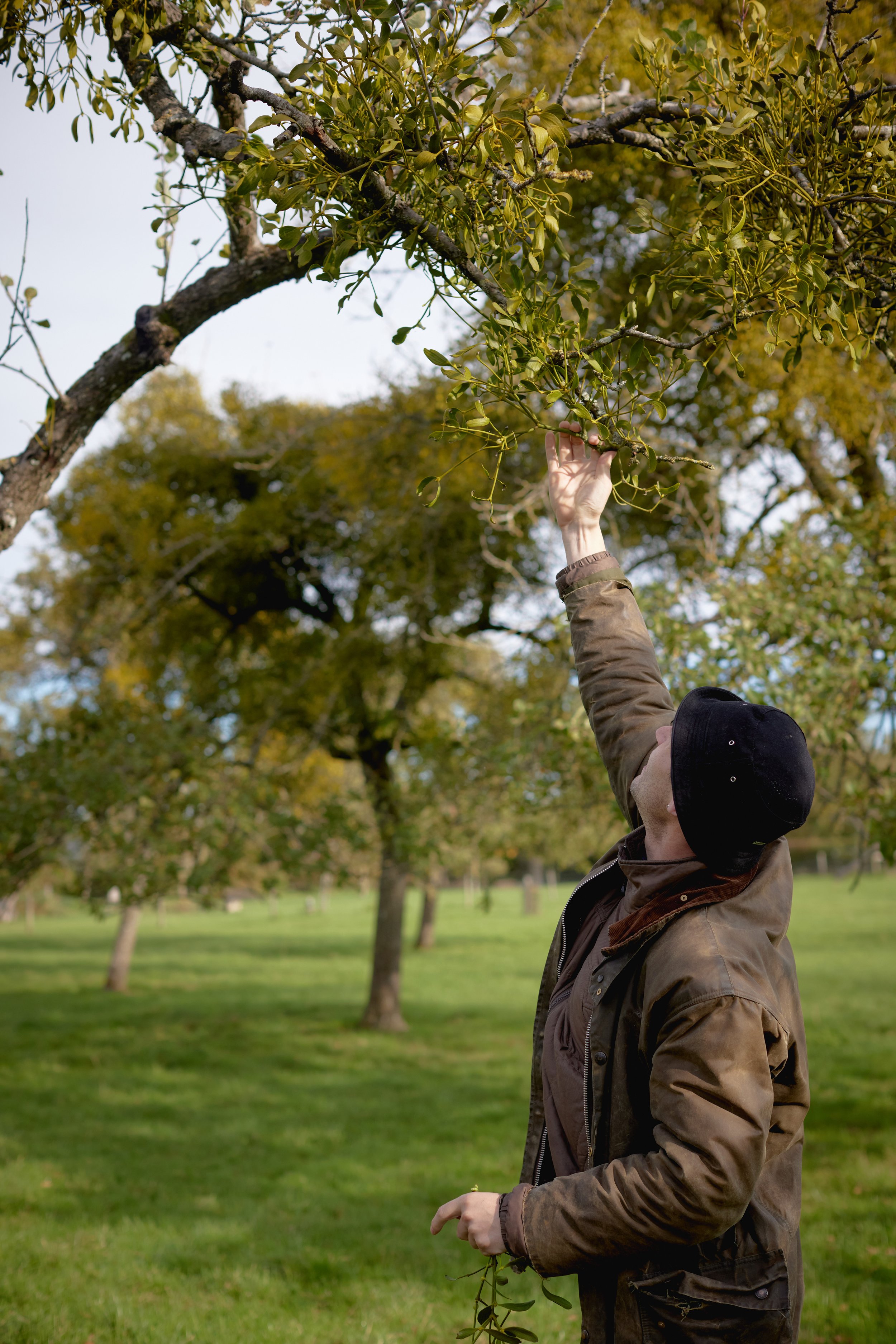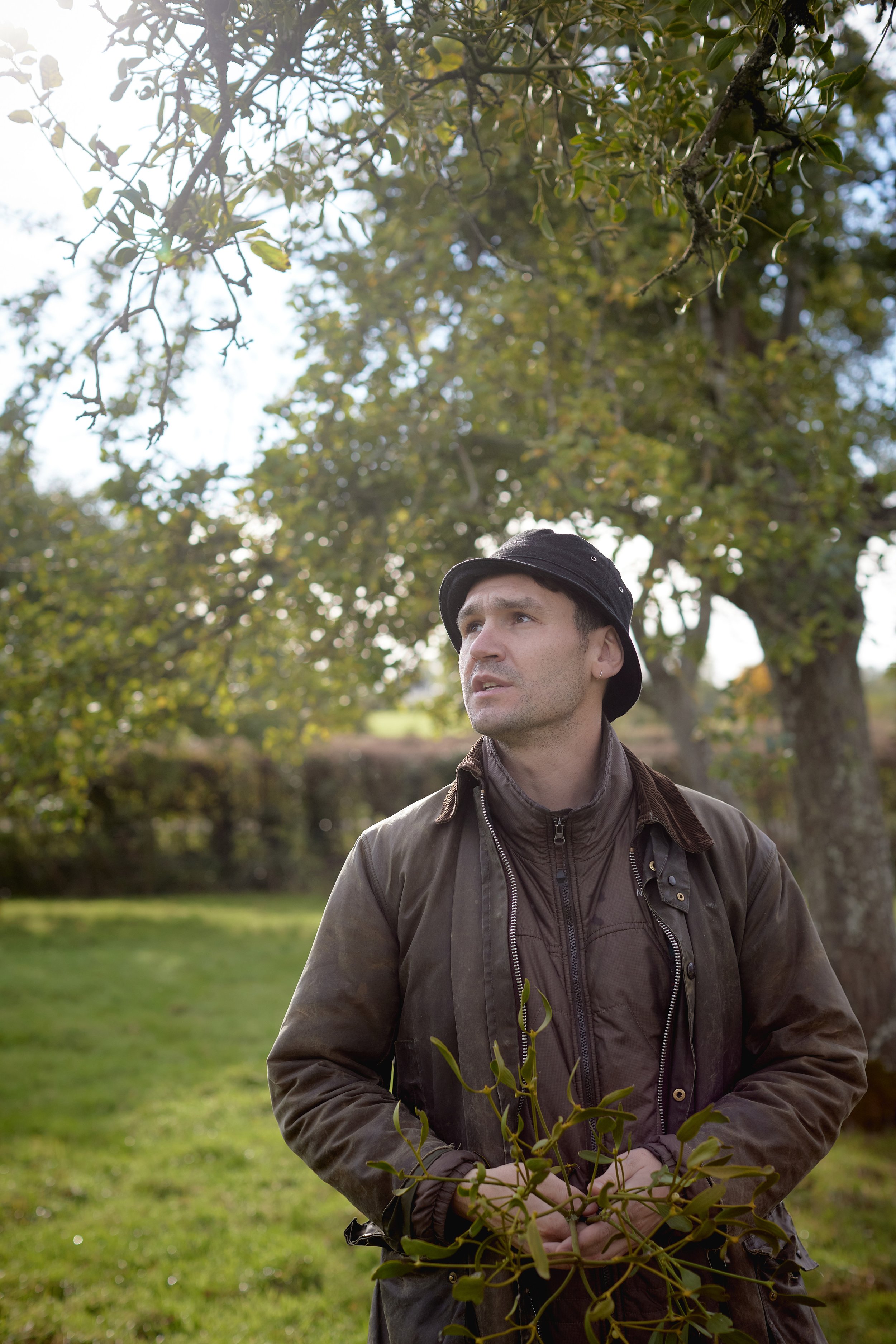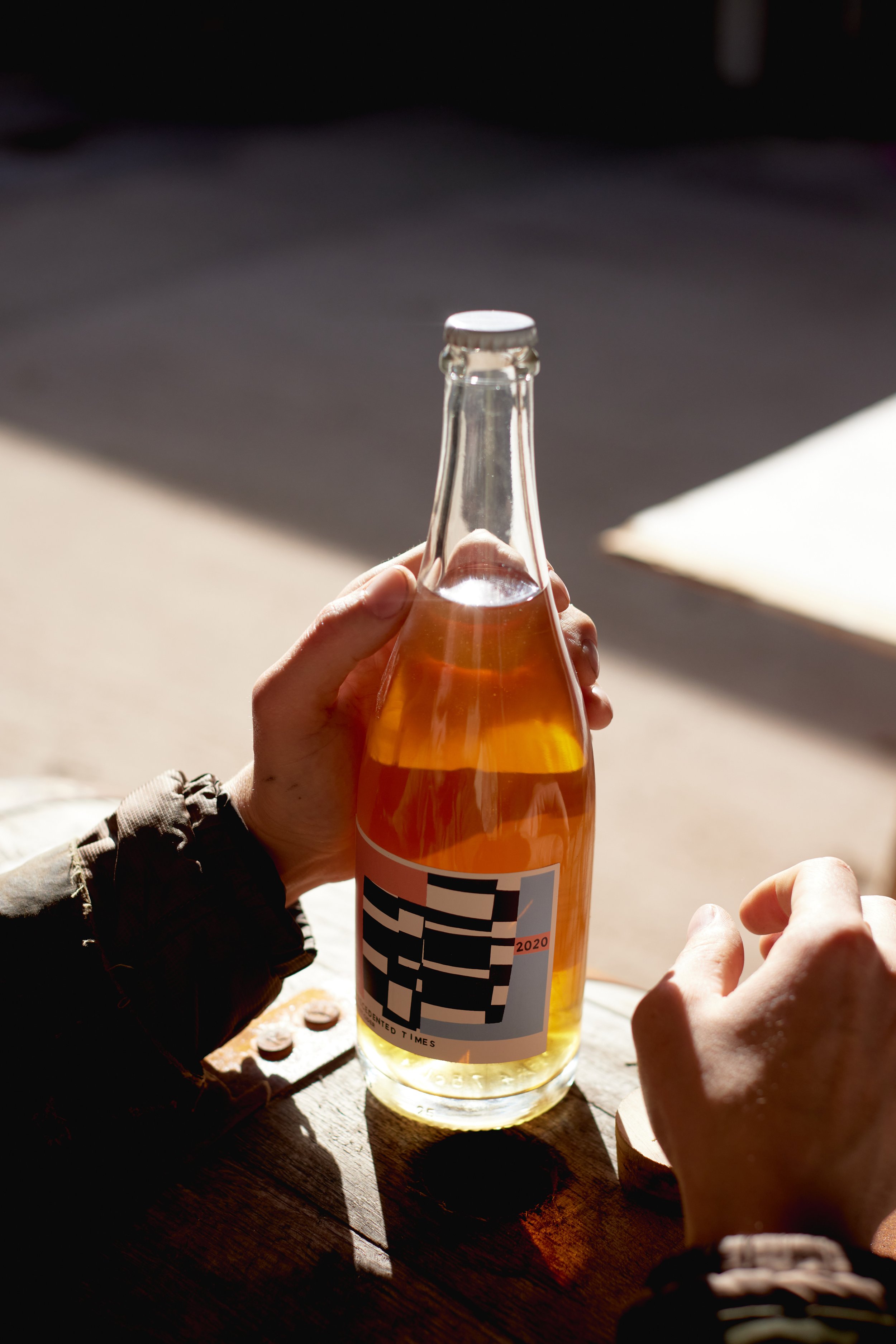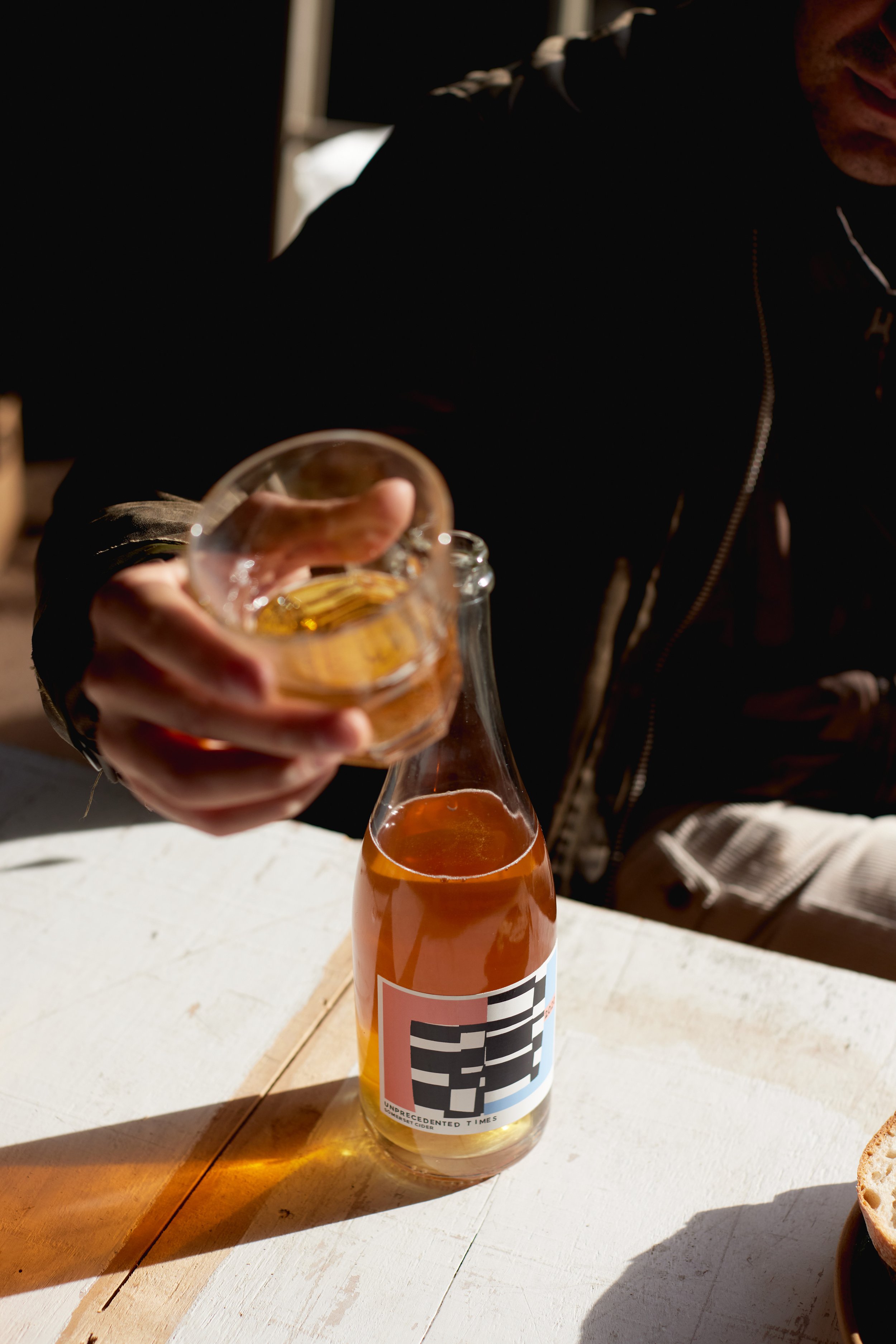Unprecedented Times — A Cidermaker’s First Cuvée with Dimpsey Cider, Somerset
It’s a miserable winter’s day in Shepherds Bush. I’m seeking shelter from the rain in a record store—vinyl spins as I scroll through the photography Ed Schofield shot for this article. Pictured are tumbling piles of russet apples, amber sunlight pouring through trees, and several portraits of Thomas Broadhead, 32, Dimpsey Cider’s founder, perched on one. This is the man I am waiting for.
I’m a wine professional, and until last year, I wasn’t much of a cider drinker. My parents find this strange, as it was certainly the most prevailing drink in our household: every year, my father would make cider from an ancient apple tree in the field near our house in Derbyshire. I have vivid memories of climbing up that tree when I was twelve, throwing down apples. I remember mashing the apples with a huge pestle made from a fallen branch and twisting the small basket press with my sisters—under close-ish supervision. Division of cidermaking labour is certainly one of the lesser-known benefits of having children.
The shop door opens and Thomas enters, dressed head to toe in black. He greets me as I imagine many cidermakers do post-harvest: warmly, yet with a palpable tiredness. Making any kind of alcohol is labour-intensive, but Thomas’ day job—running Forest Studio, his own film production company—takes up just as much of his time. He’s all smiles though. He tells me he’s brought me a gift, and hands me a black bucket hat emblazoned with the phrase “unprecedented times”.
It’s a phrase that’s come to mean so much over the last few years; it’s been memed to the point of exhaustion, but it’s one that’s followed Dimpsey since its nascence. Indeed, I learn that the project first started under lockdown, but a fondness for farming goes back further than first thought.
“My mum’s family has such a long history of farming, which is sort of fundamental to my identity,” Thomas tells me. “I never grew up on the farm, but looking back, I probably wouldn’t have wanted to be that involved as a kid.”
Instead, he went to Edinburgh to study chemistry—a decision not even he can explain—and there, he started making films. But as his career in production grew, a love for green-fingered pursuits still found ways to pop up in his life. “Every year I grew about 50 tomato plants,” he laughs. “I always went overboard, so I knew I needed to find a way to channel that energy, whether it be having an allotment or whatever.”
It wasn’t until his work took him to Somerset that the penny finally dropped. He was there to tell the story of Wilkins Cider, a venerated establishment of West Country scrumpy. Thomas had heard rumours that Roger Wilkins—who he endearingly refers to as the godfather—was about to retire. “His story fascinated me. What do you learn from 70 years of cidermaking?”
In his time working there, Thomas fell in love with the estate. But one thing frustrated him. “There was this incredible product being sold, a recipe that’s 70 years in the making, but it was all being sold in jerry cans. I felt like it was missing a trick.”
Thomas tells me that he thought about asking Roger to buy some of his cider, repackage it and sell it on as an experiment. But decided he needed freedom in whatever form this project would take.
Then, lockdown came, and fate brought Thomas even closer to the world of cider. He was isolated just 15 miles from the Wilkins estate, conveniently next to a few unattended orchards on neighbouring farms.
“No one was picking from them, so I just started knocking on their doors, asking if I could pick their apples in exchange for maintaining the orchards.” He went to Wilkins to ask how many sacks he’d need to do a whole pressing—he told him to fill 26. I’m curious though, just how welcome was this well-spoken London boy among this crowd of distinctly old-school cidermakers in Somerset?
“To be honest, I never thought Dimpsey would pick up in the way that it has because they were so suspicious of me,” he laughs. “We all knew I was nothing like them, but they gave me these sacks and wished me luck.”
The conversation then turns to an altogether more serious matter. “Around the same time, my grandparents were dying,” he says. “They both passed away in very short succession. They were the farmers, they were my agricultural connection, but I just couldn’t see them under lockdown. So when I was picking apples at five o’clock in the morning, it was like a meditation. I somehow felt like I was channelling them.”
Three weeks later, 800kg of apples had been picked by hand. But it wasn’t until the final apple had been picked that Thomas began to ask around about fermentation. Never seemingly the one to take the easy route, he decided to ferment in oak. Barrels are hard to come by for a first-time cidermaker living on a shoestring, but Thomas’ little black book came into use again.
““There was this incredible product being sold, a recipe that’s 70 years in the making, but it was all being sold in jerry cans. I felt like it was missing a trick.””
“A few years ago, I made a film about a Speyside cooperage, where they make all the barrels for famous whisky distilleries,” he says. “I gave them a call, and they sent down everything they had on a pallet. I just loaded them onto the back of my van. Next thing you know, Roger was pumping the pressed juice straight into them. That’s all we had to begin with.”
I ask if he felt like he was winging it…
“It’s a miracle it was actually a drinkable product,” Thomas admits. “We left those barrels until February, we finally tasted and were like, ‘oh, this is actually tasting quite good!’ Only then did I order the bottles and commission the artist for the label.”
And so, Dimpsey’s first cuvée, Unprecedented Times, was born. Notes of caramel apples, citrus and smoke from the barrels envelop a vibrant pétillance. Around 470 bottles were made, and those that weren’t smashed by ParcelForce found their way to London’s aesthetic-led drink spots: Bar Crispin, Gipsy Hill Brewery and—the restaurant where I first came across it—Top Cuvée.
“We chose Unprecedented Times to be on our list because of the way it used the unique, moreish qualities from all the rediscovered apple varieties,” says Alexandra Price, Head of Wine at Bar Crispin. “The ideals behind Dimpsey very much fit in with the small scale, ‘nature first’ ethos of many of our other growers. It also seemed fitting that as a new venture we could support a project that had been born in lockdown from a longtime passion—much in the same way that Bar Crispin was imagined.”
It’s safe to say that there won’t be much of the Unprecedented Times cuvée left when this feature comes out, so I ask Thomas what’s in the not-so-distant future for Dimpsey. He’s full of ideas, but faced with myriad decisions. Following the success of his first bottling, the question of scaling up is at the front of his mind.
“I’ve recently bought this 1,000 litre [steel] tank,” he says. “I think there’s going to be two ciders this year, and we’ll also do an apple cider vinegar. A lot of people say that a good cider-maker shouldn’t make a drop of vinegar, but I don’t really care if I get something ‘wrong.’” His fingers wiggle into inverted commas. “It’s got the same story, the same provenance.”
I’m in agreement. After all, it’s better to do two or three things well than develop one-hundred half-arsed SKUs. Keeping it simple is a high priority for Dimpsey now, especially seeing as Thomas’ filmmaking work has come to the fore again. Not to mention his recent move to Somerset.
He’s since moved operations from Glastonbury to Vallis Farm in Frome—a 10-bedroom farmhouse bought by the owners of Rye Bakery. It’s where Thomas has been living for the past few months, but, to be honest, it sounds more like a small business incubator than a co-living situation: a chocolatier, baker, and jewellery designer also call Vallis Farm home.
Frome itself is becoming an extension of London chic: Merlin Labron-Johnson’s Osip restaurant, a new Hauser & Wirth gallery, and all manner of independent businesses have arrived to the area. But, as Londoners know, such things come at a price to small working areas. The price of housing here has gone up by 30% in the past year alone, while, conversely, an issue with drug abuse persists. I ask Thomas—perhaps a little too bluntly—about this. Thankfully, his answer is just as frank.
“I don’t think you can exist in a place like Frome without having consideration for the fact that it’s still a working town,” He says. “If you go around acting like you’re on a day out in Notting Hill, you just won’t get along with the community.”
“I don’t want to live in the countryside and treat it as a theme park, I want to make a meaningful contribution here. This isn’t just a destination—it’s a place to live, to thrive.”




























